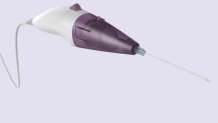 Prototype Raman ‘smart needle’ probe.
Prototype Raman ‘smart needle’ probe.
Credit: University of Exeter
One of life’s saddest and most sobering realities is a cancer diagnosis in any form at any age. For generations, scientist’s and medical experts across the globe have sought to defeat cancer once and for all, ranging from treatment, medicine, as well as a clear and early diagnosis to best rid one’s body of the disease. It is with this said that building off the diagnosis aspect of beating cancer, in recent times scientists have developed a groundbreaking method that can identify and diagnose one of the most common forms of cancer in seconds using light.
A multidisciplinary team of experts was able to develop this revolutionary “smart needle” that uses light to spot cancerous cells or tissues near instantly. Using a technique known as Raman spectroscopy, this optical biopsy probe can measure the light scattered by tissues once a low-power light is flashed onto it. In fact, the way that light is scattered then shows whether the tissues are healthy or infected, further enabling doctors and medical health professionals to identify these cancerous cells in mere seconds, allowing for faster treatment and more effective care for patients.
Furthermore, not only does the team believe that this technique can vastly improve the rate of the identification and respective treatment of cancers, but they believe that this can especially be applied to that of lymphoma which is a cancer that compromises the immune system.
While cancer diagnoses’ can be one of the scariest things on this planet, an early diagnosis is a vital factor in being able to provide effective treatment and reducing the anxiety and fear that many patients face in the modern world. As an example, typically lymphoma patients will often times have a sample of cells taken from the lump suspected to be disease ridden which is then followed by a surgical biopsy of the node to get a full diagnosis, which can take up to more than 2 weeks to get results. Instead, with the hopes of this new technology the team is anticipating that this new method will not only avoid the need for surgery, but it will also provide a less invasive and swift way of identifying whether one has lymphoma or not.
The team has even proven the ability to differentiate between a healthy tissue versus a diseased one, demonstrating pinpoint accuracy in 68 patient sample-tests through the laboratory. As a result, the team are embarked on a 3-year project to initiate a clinical trial with the devices use on patients for the first time. Funded by the National Institute for Health Research (NIHR) with a grant of around £1million, the researchers at the University of Exeter will work with their respective counterparts at the University of Bristol as well as Gloucestershire Hospitals NHS Foundation Trust, with a sustained and focus relationship focusing in on this cancer detecting method.
This “smart needle” probe is composed of fiber-optics that are encased with a fine needle that can search for cancer under the skin’s surface in areas such as the neck gland. As explained by Dr. John Day from the University of Bristol, who was the one who built the original prototype and is continuing to work on the optimal design moving forward, “If our probe is successful in clinical trials for lymphoma, then it opens the door to applying it to many other cancers in the body.”
As elaborated upon by Dr. Alex Dudgeon, a research fellow in Biomedical Spectroscopy at the University of Exeter and member of the team, “Early detection is a key factor in the successful treatment of cancers. This technique has real potential to increase the speed of lymphoma diagnosis.” Dr. Dudgeon then goes on to explain that “It could potentially bring huge advantages over traditional methods providing an instant diagnosis, reducing patient anxiety and it may eliminate the need for unnecessary diagnostic surgery. As a result, there can be a much-improved patient experience and significant cost and time savings for the NHS.”
Bringing everything full circle, as stated by Mr. Charlie Hall, a Head and Neck Consultant at Gloucestershire Hospitals NHS Foundation Trust, “”This is an exciting project that has the potential to revolutioni(z)e our diagnostic approach to cancers occurring in the head and neck region. Early and accurate diagnosis is the key to better cancer treatment outcomes and will also have significant economic benefits to the wider NHS.” With this advancement comes a great step forward in one day being able to rid of cancer for good, or at the very least in the near present allow for more effective treatment to start at the onset after an effective initial diagnosis. This is a piece of groundbreaking technology that is sure to make a change in the world for a better tomorrow, and one that is surely something to champion across the globe.
Why We Are One
For over 40 years, IBS Electronics Group has provided a broad range of integrated supply chain and electronicsmanufacturing solutions tailored specific to our customer's operations. As your one source for the industry’s top brands all in one place, our engineers specialize in reducing supply chain complexity and are here to provide you with dedicated support from prototype to production.




.png)


.png?resizemode=force&maxsidesize=96)